Are you looking for calm and docile doodle dogs to add to your family? If so, then you may want to consider a doodle. Doodles are bred from a mix of two different dog breeds, which typically results in a dog that is calmer and more laid-back than either of its parents. In this blog post, we will list twelve of the most calming doodle breeds to choose from. So whether you’re on the hunt for a new family pet or are simply curious about this popular hybrid breed, read on for some enlightening information!
A lot of people think that doodles are always high-energy, hyper dogs.
This isn’t always the case though! There are a number of doodle breeds that are quite calm and would be a good fit for families looking for a low-key pet.
Today we’re going to take a look at the 12 calmest doodle breeds to help you decide if it’s right for your family.
Cavapoo
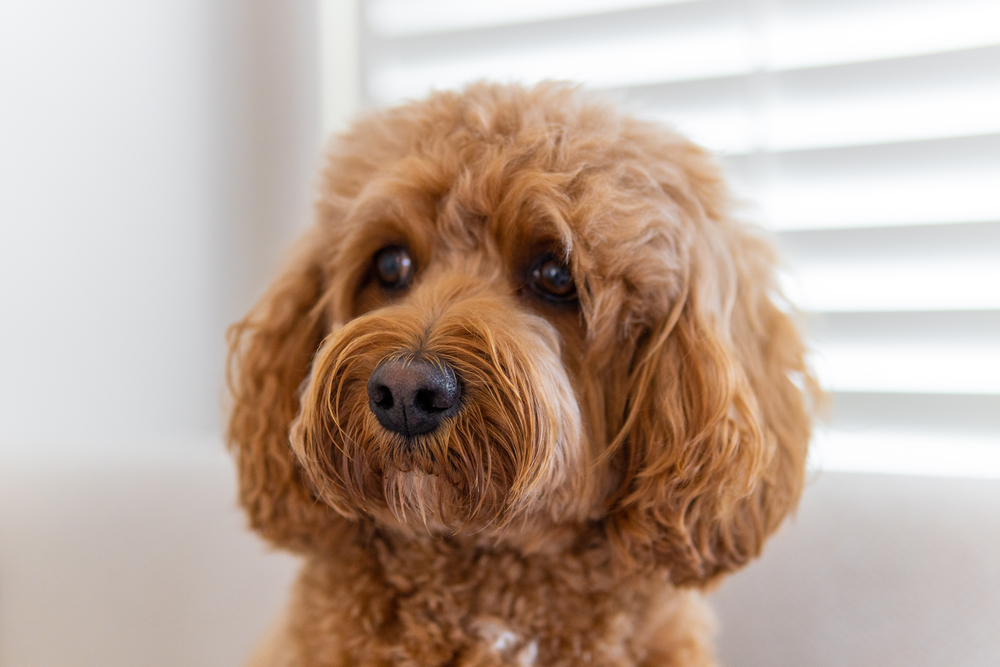
The Cavapoo is a cross between the Cavalier King Charles Spaniel and the Toy or Miniature Poodle.
Cavapoos are one of the most popular Doodle breeds because they are known for being great with children and other pets.
They are gentle, loving, and make great cuddle buddies. Cavapoos tend to be on the smaller side, typically weighing between 10 and 25 pounds.
Typical Weight: 9-25 pounds
Typical lifespan: 10-14 years
Common Health issues:
- luxating patellas
- hip dysplasia
- mitral valve disease
- progressive retinal atrophy,
- entropion
- cataracts
- glaucoma.
Shih-Poo
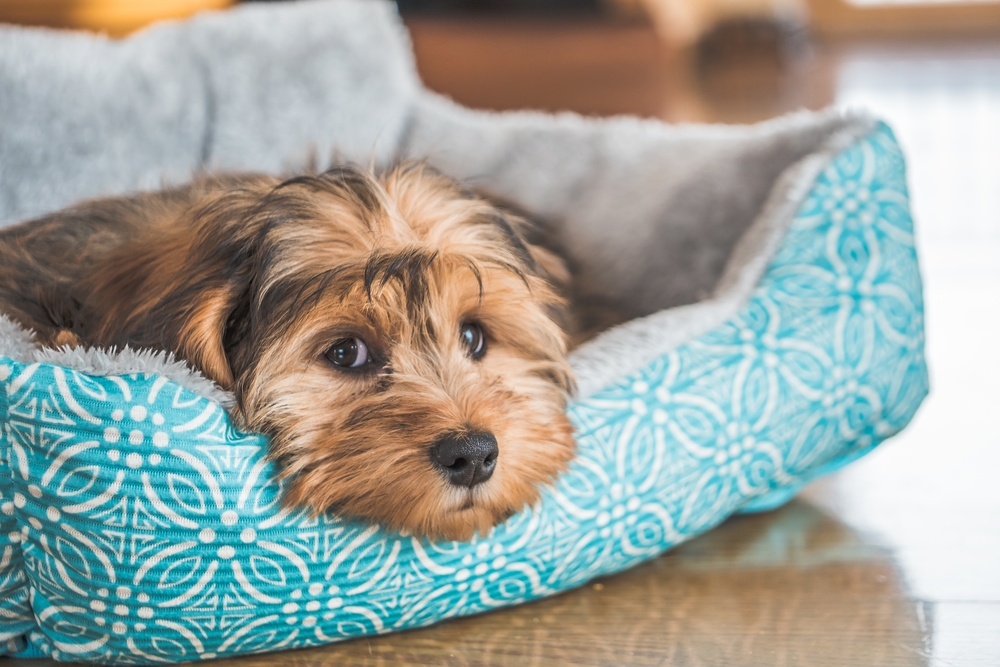
The Shih Poo is a cross between the Shih Tzu and Minature or Toy Poodle.
Shih-Poos are one of the smaller Doodle breeds, typically weighing between 8 and 16 pounds. They are known for being loving, gentle, and great with children.
Shih-Poos tend to have a moderate amount of energy and do well with a daily walk or playtime in the yard.
Typical Weight: 8-16 pounds
Typical lifespan: 10-16 years
Common Health issues:
- hypothyroidism
- Patellar luxation
- Renal dysplasia
- Lung disorders
- Von Willdebrand’s Disease
- Cleft Palate
- Intervertebral Disk Disease
Pyre-doodles
The Pyre-doodle is a cross between the Great Pyrenees and Standard Poodle.
Pyre-doodles are one of the larger Doodle breeds, typically weighing between 80 and 150 pounds. They are known for being gentle giants that are great with children and other pets.
Pyre-doodles have a moderate amount of energy and do well with a daily walk or playtime in the yard.
Typical Weight: 80-150 pounds
Typical lifespan: 10-12 years
Common Health issues:
- Bloating
- Cancer
- Cushing’s Disease
- Patellar Luxation
- Hypothyroidism
Bernedoodles
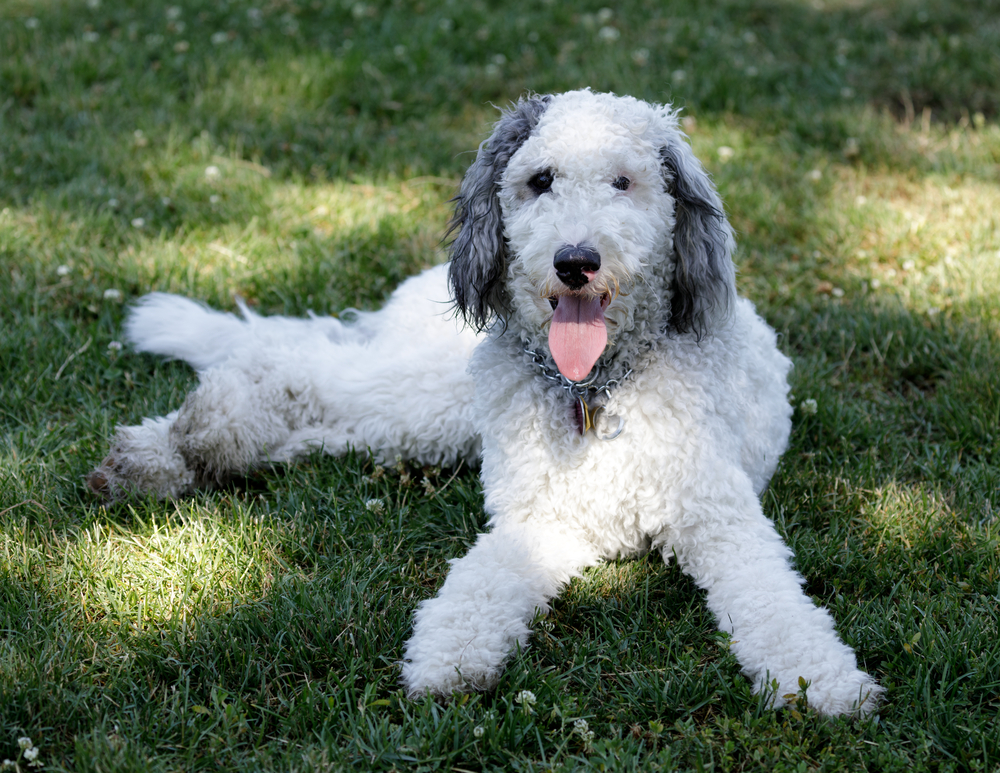
The Bernedoodle is a cross between the Bernese Mountain Dog and Standard Poodle.
Bernedoodles are one of the larger Doodle breeds, typically weighing between 60 and 100 pounds. They are known for being loving, gentle, and great with children.
Bernedoodles have a moderate amount of energy and do well with a daily walk or play time in the yard.
Typical Weight: 60-100 pounds
Typical lifespan: 12-18 years
Common Health issues:
- Hip dysplasia
- Elbow dysplasia
- Eye problems
- Allergies
- Hot spots
Newfypoo
The Newfypoo is a cross between the Newfoundland and Standard Poodle.
Newfypoos are one of the larger Doodle breeds, typically weighing between 80 and 150 pounds. They are known for being gentle giants that are great with young children and other pets.
Newfypoos have a moderate amount of energy and do well with a daily walk or play time in the yard.
Typical Weight: 80-150 pounds
Typical lifespan: 9-12 years
Common Health issues:
- Cherry eye retinal atrophy
- Subvalvular aortic stenosis
- Bone problems
- Thyroid issues
- Elbow dysplasia
- Hip dysplasia
- Patellar luxation
Sheepadoodle
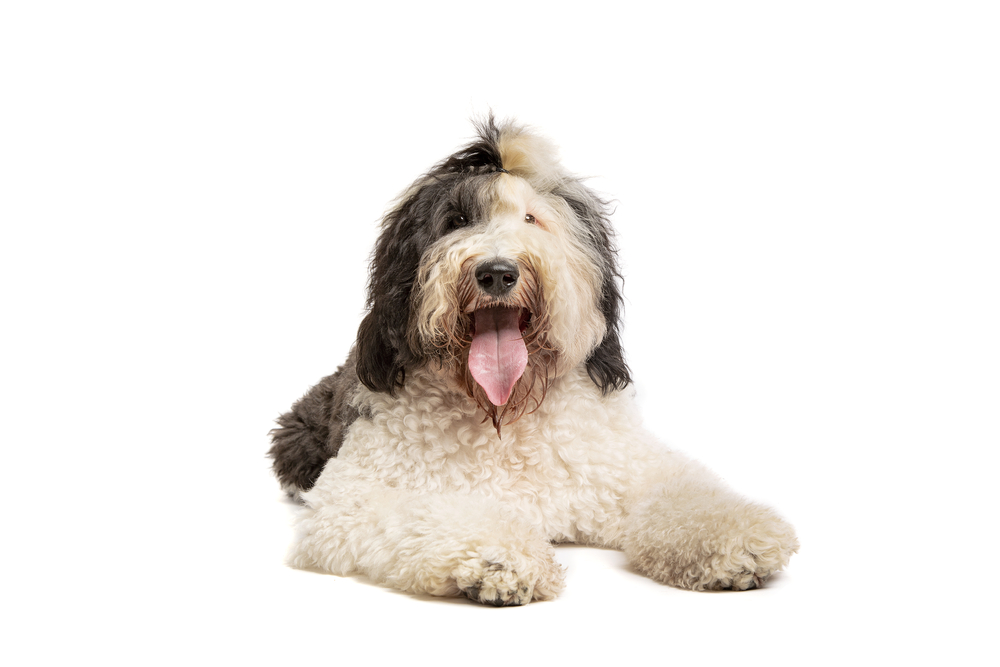
The Sheepadoodle is a cross between the Old English Sheepdog and Standard Poodle.
Sheepadoodles are one of the larger Doodle breeds, typically weighing between 60 and 100 pounds. They are known for being loving, gentle, and great with children.
Sheepadoodles have a moderate amount of energy and do well with a daily walk or play time in the yard.
Typical Weight: 60-100 pounds
Typical lifespan: 12-15 years
Common Health issues:
- Bloat
- Hip dysplasia
- Addison’s disease
- Joint issues
- Sebaceous adenitis
- Skin disorders
Cockapoo
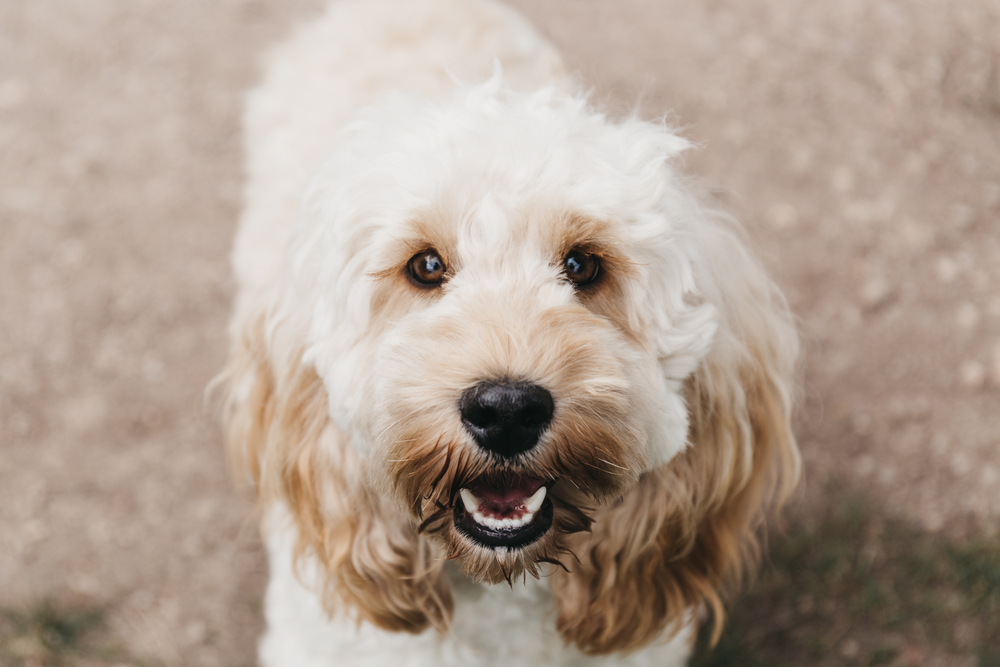
The Cockapoo is a cross between the Cocker Spaniel and Toy or Miniature Poodle.
Cockapoos are one of the most popular Doodle breeds because they are known for being great with children and other pets. They are gentle, loving, and make great cuddle buddies. Their small size can make them perfect for apartment living.
Cockapoos tend to be on the smaller side, typically weighing between 10 and 25 pounds.
Typical Weight: 10-25 pounds
Typical lifespan: 12-15 years
Common Health issues:
- Luxating patella
- Hip dysplasia
- Progressive retinal atrophy
- Hereditary Cataract
- Glaucoma
- Corneal Ulcerations
- Allergies
- Ear infections
Whoodles
The Whoodle is a cross between the Soft-Coated Wheaten Terrier and Standard Poodle.
Whoodles are one of the larger Doodle breeds, typically weighing between 40 and 70 pounds. They are known for being loving, gentle, and great with children.
Whoodles have a moderate amount of energy and do well with a daily walk or play time in the yard.
Typical Weight: 40-70 pounds
Typical lifespan: 12-15 years
Common Health issues:
- Eye infections
- Kidney issues
- Addison’s disease
- Hip dysplasia
- Ear infections
- Allergies
- Progressive retinal atrophy
St. Berdoodles
The Saint Berdoodle is a cross between the St. Bernard and Standard Poodle.
St. Berdoodles are one of the larger Doodle breeds, typically weighing between 80 and 150 pounds. They are HUGE dogs, but they can be a great choice, especially with the right training.
St. Berdoodles have a moderate amount of energy and do well with a daily walk or play time in the yard.
Typical Weight: 80-150 pounds
Typical lifespan: 8-10 years
Common Health issues:
- Hip dysplasia
- Ear infections
- Wobbler Syndrome
- Bloat
- Skin problems
- Willebrand’s disease
Labradoodles
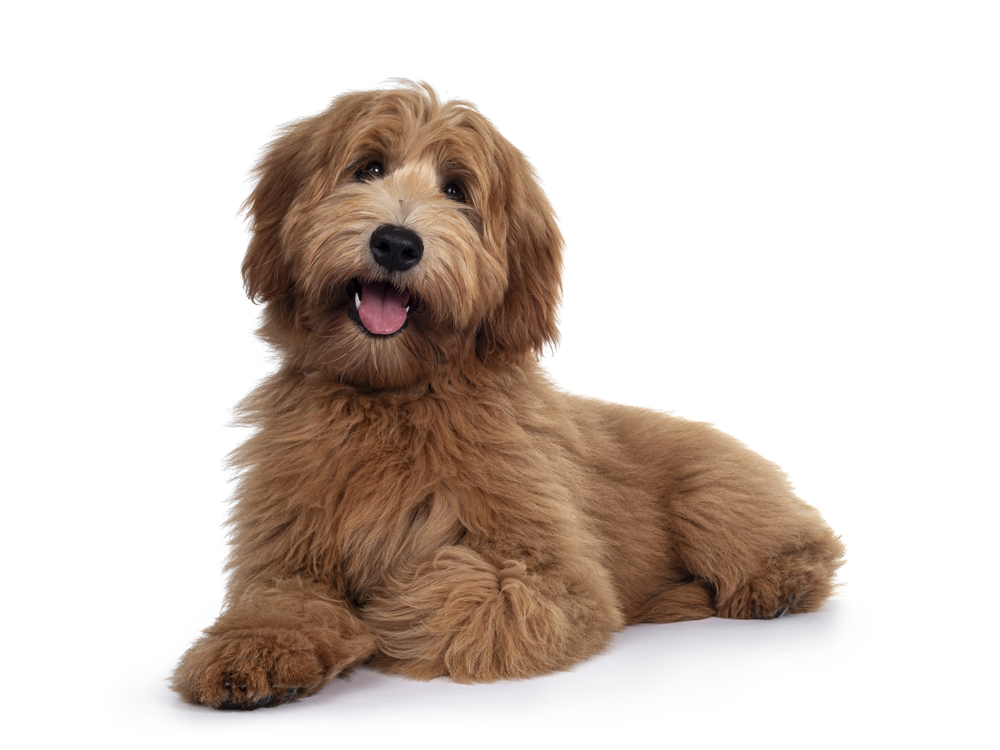
The Labradoodle is a cross between the Labrador Retriever and Standard Poodle.
Labradoodles are one of the most popular Doodle breeds because they are known for being great with children and other pets. They are gentle, loving, and make great cuddle buddies.
Labradoodles come in a variety of sizes, from the mini or toy size which typically weighs between 10 and 25 pounds, to the standard size which typically weighs between 50 and 100 pounds.
Typical Weight: 10-25 (mini/toy), 50-100 (standard) pounds
Typical lifespan: 12-15 years
Health Issues:
- Hip dysplasia
- Progressive retinal atrophy
- Von Willebrand’s Disease
- Addison’s disease
Maltipoos:
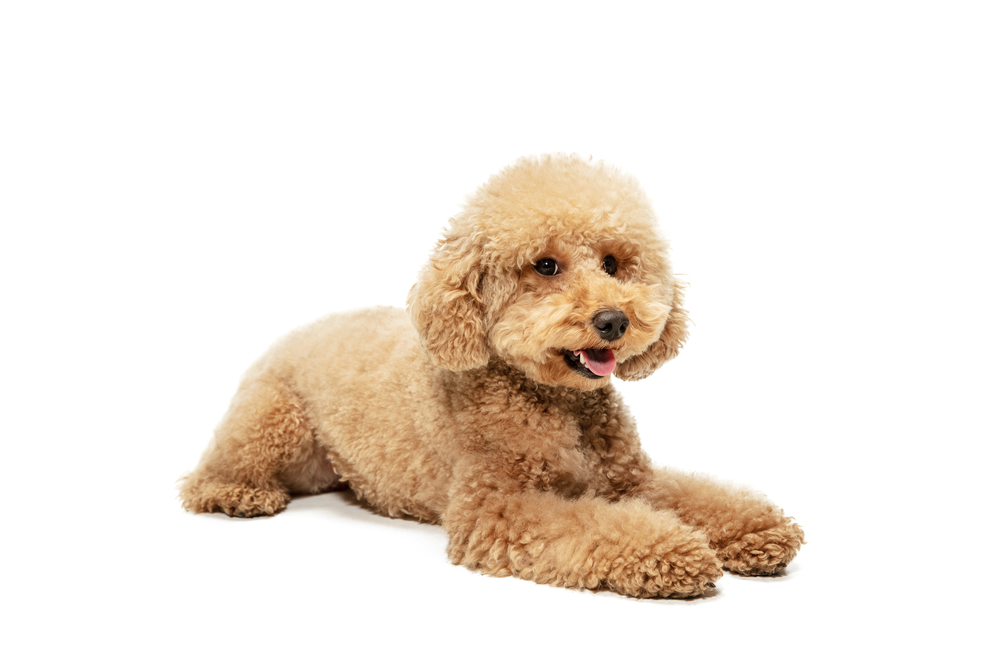
The Maltipoo is a cross between the Maltese and Toy or Miniature Poodle.
Maltipoos are one of the most popular Doodle breeds because they are known for being great with children and other pets. They are gentle, loving, and make great cuddle buddies.
Maltipoos tend to be on the smaller side, typically weighing between 4 and 9 pounds.
Typical Weight: 4-9 pounds
Typical lifespan: 10-15 years
Common Health issues:
- White shaker syndrome
- Epilepsy
- Patellar luxation
- Portosystemic shunt
- Legg calve perthes disease
- Retinal Atrophy
- Tiny mouth syndrome
- Colitis
Golden Mountaindoodles
The Golden Mountaindoodle is a cross between the Goldendoodle and Bernedoodle.
Golden Mountainoodles are one of the larger Doodle breeds, typically weighing between 60 and 100 pounds. They are known for being loving, gentle, and great with children.
Golden Mountaindoodles have a moderate amount of energy and do well with a daily walk or play time in the yard.
Typical Weight: 60-100 pounds
Typical lifespan: 13 years
Common Health issues:
- Hip dysplasia
- Elbow dysplasia
- Eye problems
- Hot spots
- Allergies
- Certain cancers
Why pick a doodle?
fewer health problems than purebred dogs
great therapy dogs
great family pets
excellent companions
smart dogs
small children
hypoallergenic dog
separation anxiety
What about Goldendoodles?
Goldendoodles are probably the most popular breeds out there. They are known for being great for families and good with children.
With that said, they really aren’t the calmest breed – they are actually really high-energy dogs. They are high-maintenance dog that requires a lot of mental stimulation and so much physical exercise.
There are some breeders who will breed specifically for calm Goldendoodles, and if you have your heart set on a Goldendoodle, seek one of those out.
With training, they can be calm – but they don’t tend to be lap dogs! They are great family dogs and one of the best poodle mixes around, but in our experience, they aren’t super calm (especially as puppies). They are a very loving dog breed, which is why so many love them.
A Word On Puppies
All puppies are going to have a lot of energy regardless of the breed. It’s important to remember that this is just a phase and it will pass.
Doodles are no different and all of the breeds on this list can be calm dogs if they are trained and exercised properly. If you are adopting from a breeder, they can help guide you to a puppy that might be a little more calm and submissive, if that’s the type of pup you are looking for.
Large or small dog?
Many of these different breeds have standard, medium, or mini versions. Larger dogs actually tend to have an reputation for being calmer and more laid back, while smaller ones are more known for being a little more hyper.
This isn’t always the case – you can find a hyperactive large dog and a calm tiny dog. It often comes down to genetics and training. One thing to keep in mind is that a smaller dog who has more energy can be easier to wear out – and some of their behaviors when hyper aren’t as distressing as a hyper larger dog.
Temperament Matters
When you are picking out your forever dog, it’s important to pick a dog with a temperament that fits your lifestyle. There are calm and hyper dogs in every litter and in every shelter.
If you are looking for a calm dog, make sure you communicate that with the breeder, shelter or rescue that you are working with. Here are a few tips.
When working with a breeder…
First off – pick a reputable breeder (ie, not a backyard breeder). Responsible breeds put a lot of time, money, and effort into breeding quality dogs, and they want to make sure they match the right dogs with the right owner.
Here are a few things to ask/discuss when choosing your pup:
- Tell the breeder that you are looking for a dog with a calmer temperament
- Ask to see the parents and evaluate their temperaments
- Work with a reputable breeder who breeds for certain personality traits
Remember – all puppies have energy! But there are some in a litter that would be better suited for a calmer lifestyle overall.
When working with a shelter/rescue
It can be a little trickier to identify a dog’s qualities when they are in a shelter or part of a rescue. Often, these dogs have been in difficult circumstances, and if they are living in a shelter, that can be really overwhelming.
However, many shelters and rescues do temperament testing so they can provide some insight into the dogs that are being adopted. While doodles aren’t super common to find in shelters, they do occasionally end up there. If you see one, make sure you get as much information as you can. Often when they are in a shelter, they are ex-breeding dogs that were rescued and may have lived their live outside or in unfortunate circumstances.
Working with a rescue or shelter that allows foster to adopt can be a great way to see if a dog fits in with your family and lifestyle. Keep in mind that it usually takes some time for a dog to settle in – so make sure to be patient!
When adopting from a private party…
If you are adopting a dog from another individual or party that has had the dog for quite some time, they can give you more insight into the dog and its temperament. This requires a lot of trusts that the individual is giving you the correct information (some people do withhold less-than-desirable information in an attempt to rehome the dog as quickly as possible).
Be very straightforward with your questions and concerns – if possible, take some time to visit the dog a few times before you officially adopt them. You can request to see how the dog reacts around you, your children, your spouse/partner, other pets, and in different circumstances.
So there you have it – the 10 calmest doodle breeds! If you’re looking for a low-key pet that is great with children and other pets, any of these breeds would be a good fit. Just be sure to do your research before you decide on one, as all doodles require plenty of exercise and training

Leave a Reply